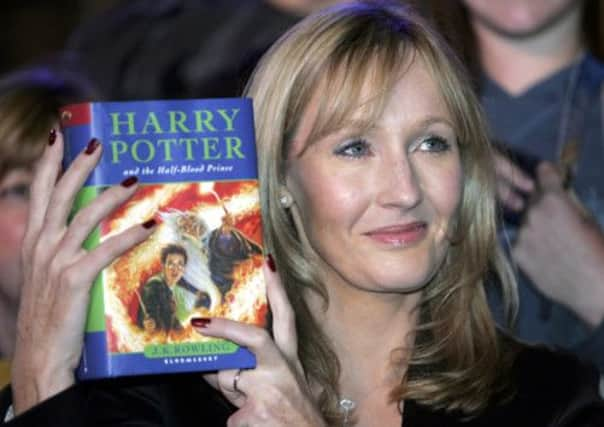JK Rowling revealed as detective novel author


Robert Galbraith, a supposed former Royal Military Police investigator, won the praise of his peers and was tipped as one to watch after his first book, The Cuckoo’s Calling, was published earlier this year to critical acclaim and which took the literary charts by storm.
But, after real-life detective work, Galbraith has been exposed as a work of fiction, a pseudonym of bestselling novelist Rowling, in what is being hailed as one of the greatest literary coups in decades.
Advertisement
Hide AdRowling yesterday admitted the deception, describing the ability to write and release a book under a pen name without expectation and scrutiny as “such a liberating experience”.
The revelation has sent sales soaring, with the book rocketing from 4,159th to first place in the Amazon chart yesterday.
The book was released in April to considerable praise and had since sold 1,500 copies in hardback, regarded as a success for a first release.
The audiobook, narrated by Spooks and Hustle actor Robert Glenister, topped the charts on Audible.
The ploy was only exposed when journalists looked into the book’s supposed author, and found Galbraith shared Rowling’s agent, editor and publisher.
“I had hoped to keep this secret a little longer because being Robert Galbraith has been such a liberating experience,” Rowling said.
Advertisement
Hide AdShe spoke of how pressure had grown ahead of the publication of each Harry Potter book and The Casual Vacancy, her first non-Potter novel.
“It has been wonderful to publish without hype or expectation, and pure pleasure to get feedback under a different name,” she said.
Advertisement
Hide AdDavid Shelley, her editor, had been “a true partner in crime”, she said.
The novel was published by Sphere, an imprint of Little, Brown, which published The Casual Vacancy.
There were other clues also. Mr Shelley is the firm’s most senior editorial figure and his appointment to work with Galbraith, a first-time author yet to prove his talent, seemed unlikely.
It is thought that Rowling originally approached other publishers, possibly to prevent such a connection being made.
Kate Mills, fiction editor at Orion Books, said she had been sent the completed draft, which she described as “well-written but quiet,” and turned it down.
“So, I can now say that I turned down JK Rowling. I did read and say no to Cuckoo’s Calling. Anyone else going to confess?” she tweeted.
Advertisement
Hide AdThe book follows private detective Cormoran Strike as he investigates the apparent suicide of supermodel Lulu Landry, who fell to her death from a snow covered balcony in Mayfair.
Val McDermid, the Scottish author, said that the novel had reminded her of “why I fell in love with crime fiction in the first place”.
Advertisement
Hide AdPeter James, another crime writer, said: “I thought it was by a very mature writer, and not a first-timer.”
Two independent computer linguistic experts, Peter Millican from Oxford University and Patrick Juola from Duquesne University in Pittsburgh, ran the last Harry Potter novel and The Casual Vacancy, plus The Cuckoo’s Calling, along with two other detective books, through their specialist programmes.
“It was striking that The Cuckoo’s Calling came out significantly closer to A Casual Vacancy and even Harry Potter and the Deathly Hallows than the other books,” Mr Millican said.
It is believed that the second Strike book will be published next year under the name of Robert Galbraith.
Author was just as much a work of fiction as his novel
LITERARY agents behind JK Rowling’s new crime novel went to considerable lengths to bring the fictitious Robert Galbraith to life, including entering a fake profile onto their website alongside well-known writers.
The Blair Partnership, run by Neil Blair, added the image of a shadowed figure next to other clients, complete with a fictitious backstory and mention of Galbraith being married with two sons.
Advertisement
Hide AdIt appears alongside Frank Lampard, who has authored a children’s adventure book, Sophie Nicholls, author of the bestseller The Dress, and Rowling, who uses the same agent.
It states: “Born in 1968, Robert Galbraith is married with two sons. After several years with the Royal Military Police, he was attached to the SIB (Special Investigation Branch), the plain-clothes branch of the RMP. He left the military in 2003 and has been working since then in the civilian security industry.
Advertisement
Hide Ad“The idea for Cormoran Strike grew directly out of his own experiences and those of his military friends who have returned to the civilian world.”
The protagonist is a wooden-leg wearing Cornishman damaged physically and psychologically after a land mine explosion in Afghanistan, and has been praised as a literary creation by critics.
“Instantly absorbing, featuring a detective facing crumbling circumstances with resolve instead of clichéd self-destruction and a lovable sidekick with contagious enthusiasm for detection”, Booklist wrote, adding that the novel benefitted from “Galbraith’s skilled storytelling”.
Pen friends
NOMS de plume have been used for centuries, not least by women whose publishers believed they would sell better if readers thought they were male.
Charlotte, Emily, and Anne Brontë all wrote under pseudonyms. Stephen King used Richard Bachmann to write more frequently at a time when publishers believed any more than one book per year would devalue the author’s brand.
Kirby McCauley, his agent, used a picture of his insurer Richard Manuel, and took the surname from photographer Claudia Inez Bachman.
William Makepeace Thackeray, author of Vanity Fair, used outlandish pen names, including George Savage Fitz-Boodle, Michael Angelo Titmarsh, Théophile Wagstaff, and CJ Yellowplush, Esq.